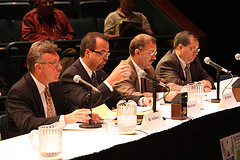Looming farm bill deadlines have ag leaders fretting

 In their rush to take advantage of the supercommittee legislative process that could fast track an ag budget bill, agricultural leaders in D.C. have been tasked with pushing a full Farm Bill with comprehensive subsidy reforms in a matter of weeks. What's more, Congressional ag committees have to follow a supercommittee mandate to reduce federal agricultural spending by $23 billion over the next ten years while balancing the interests of a myriad of farm groups, each of whom fear that their segment of the industry will soon be asked to do more with less.
In their rush to take advantage of the supercommittee legislative process that could fast track an ag budget bill, agricultural leaders in D.C. have been tasked with pushing a full Farm Bill with comprehensive subsidy reforms in a matter of weeks. What's more, Congressional ag committees have to follow a supercommittee mandate to reduce federal agricultural spending by $23 billion over the next ten years while balancing the interests of a myriad of farm groups, each of whom fear that their segment of the industry will soon be asked to do more with less.
The only consensus among commentators is that uncertainty clouds all levels of the quasi-public process, which is being handled by select members of House and Senate Agricultural Committees. Critics of a supercommittee-dictated Farm Bill say the process does not allow enough time for a prudent reevaluation of agriculture's direct payment subsidy system – a major change which would have far-reaching repercussions on the profitability of conventional commodity farming in America. But Ag committee leaders counter that by acting before the current Farm Bill is set to expire in September of 2012, they can stave off larger cuts that would have to come later on.
Agriculture leaders have already missed a Nov. 1 deadline to disclose details of a plan that would, naturally, center on subsidy and crop insurance reform. So far, the only ideas discussed publicly involve replacing the direct and counter-cyclical payment plan with an expanded crop-insurance scheme to cover “short losses” these farmers might incur each year. According to a recent AP report, the politically favored short loss crop insurance “policies would kick in when producers’ revenue falls below 'normal' by a certain percentage to partially cover the gap between 'normal' revenue and the point where crop insurance comes into play.”
Other revenue protection plans have been pitched by farm groups who represent the growing influence of specialty crop producers. The American Farm Bureau Federation, however, is open to adjusting the current system of subsidy payments instead of eliminating it entirely. In a letter to ag committee members last week, Farm Bureau President Bob Stallman emphasized the potential waste inherent in broader revenue insurance coverage, because shallow losses "do not typically jeopardize the survival of a farm operation."
According to Iowa State University agricultural economist Bruce Babcock:
"The only rationale for a new federal revenue guarantee program on top of existing revenue insurance programs is that it seems politically easier to defend than direct payments."
Babcock released a report last week that was commissioned by the Environmental Working Group. In it he calls revenue insurance a "boondoggle."
Other groups see the lack of public input into the 2012 Farm Bill as a way to protect Big Ag interests ahead of a primed election-year debate over a sensible way to re-appropriate federal agricultural dollars. Rep. Ron Kind (D-Wisc) wrote a bipartisan letter to his colleagues last week announcing his concern that legislators in favor of reducing farm subsidies are being shut out of the loop. Kind's letter was signed by 26 other House members.
"The concern is that the committee tries to use this to rewrite a farm bill with new mandatory spending when the goal is cost savings," said Kind. "These are complicated programs and they should be properly vetted. There are huge consequences."
Even if Congressional Ag Committees can agree on a spending proposal in time (the Supercommittee needs a Congressional-Budget-Office-approved bill for their review by Nov. 23), there are no guarantees that they will be able to persuade their rank-and-file members to support it, making the passage of a Farm Bill before Christmas an iffy prospect.
All of this “is a very alarming environment that agriculture is facing, along with the rest of the country” said Charlie Stenholm, former Texas Congressman who served as the ranking Democrat on the House Agricultural Committee during his last eight years of office until 2004.
In an AgriTalk radio interview, Stenholm voiced concerns about the integrity of the entire project:
“If [Congress] doesn't come close to what Simpson Bowles suggested in getting $4 trillion in budget cuts – not $1.2 trillion – if they don't do that we'll be right back in the soup next year...agriculture will take a bite now and we'll get a bigger bite next year.”



